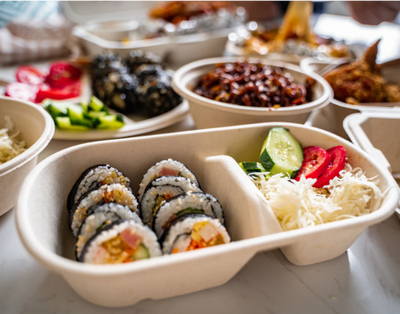Have you ever wondered what’s in your food packaging? You might think that it’s just paper, cardboard, or plastic, but something else is lurking in there that you don’t know about, something that is harmful to your health and the environment - something called PFAS.
The appearance of “forever chemicals” found in a recent study published in Food Additives and Contaminants raises an alarming concern for consumers about commodities they use routinely without question. When even 90% of paper straws contain PFAS, consumers have all the right to wonder whether PFAS are also in food packaging made from plastic or paper.
Unfortunately, it’s inevitable that those products require strong water and grease resistance, which is why they often incorporate PFAS due to their "stubborn" structure.
What are PFAS and Why are They Bad?
PFAS stands for per- and polyfluoroalkyl substances, which are a group of man-made chemicals that have been widely used since the 1940s in various products, such as non-stick cookware, water-repellent fabrics, stain-resistant carpets, and firefighting foams. PFAS are also known as “forever chemicals” because they do not break down easily in the environment or the human body.
Why are PFAS bad?
PFAS are proven to cause serious health problems, such as cancer, liver damage, thyroid disease, reduced fertility, and immune system disorders. PFAS can contaminate our drinking water, food, soil, and air.
According to a recent Environmental Working Group (EWG) study, 90% of paper straws tested positive for PFAS. This means we could ingest these harmful chemicals every time we use a paper straw. Worse, the threat of PFAS contamination also extends to the common food packaging we use daily.
How Do PFAS Get into Food Packaging?
As mentioned, PFAS are a part of food packaging because of their extreme resistance to grease, oil, water, and heat. However, this also means that PFAS are very likely to leach into our food and drink, which are often in direct contact with the packaging. Moreover, when packaging is disposed of, PFAS can end up in landfills or incinerators, further polluting the environment.
Recent research by Consumer Reports tested 100 food packaging products from restaurant and grocery chains, including some big fast-food names such as McDonald's, Chick-fil-A, and Burger King. The results were alarming: PFAS were found in many types of packaging, from paper bags for french fries and wrappers for hamburgers to molded fiber salad bowls and single-use paper plates.

PFAS found in fast food wrappers and containers
Worse, chains that promote healthier fare, like Cava and Trader Joe’s, also provide products that contain PFAS.
The availability and durability of these “forever chemicals” make them the “ideal” choices for manufacturers, but not at all optimal for consumers and the environment.
How Can We Reduce Our Exposure to PFAS?
One way to avoid PFAS is to use eco-friendly alternatives to plastic and paper packaging whenever possible. For example, EQUO’s sugarcane food containers are 100% plastic-free, PFAS-free, biodegradable, and compostable. Made from sugarcane bagasse - a renewable and natural resource with no chemical additives, our food containers guarantee function while safeguarding the well-being of consumers.

EQUO’s sugarcane food containers are suitable for hot and cold foods and are microwave and freezer-safe. Thanks to their versatility and sturdiness, you can use them for takeout, delivery, catering, or any other occasion that requires disposable containers. And when you’re done with them, you can simply toss them in your compost or regular trash bin. They will decompose naturally within 90 days without leaving any harmful residues behind.
Make the change today to avoid PFAS and safeguard your health and the environment from these harmful chemicals!


